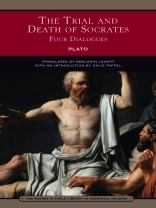“The European philosophical tradition. . .consists of a series of footnotes to Plato.” — Alfred North Whitehead
The dialogues of Plato stand alongside the Bible and Homer’s Iliad and Odyssey as foundational texts of Western civilization. The works of Plato collected under the title The Trial and Death of Socrates have been particularly influential. This is because they provide both an excellent point of entry into Plato’s vast philosophy and a vivid portrait of Plato’s mentor, Socrates – one of the most uncompromising intellectuals in the pantheon of human history. It is predominantly through Plato’s account in these works of the words and actions of Socrates during his trial and execution for impiety that the latter’s nobility and profound integrity have become known to succeeding generations.
Sobre o autor
Plato was born to an aristocratic Athenian family in 427 BC, became an adherent of the already notorious arguer Socrates in his youth, and likely abandoned Athens for several years following Socrates’ execution in 399 BC. Back in Athens, he founded his infamous school, the Academy, on his estate of the same name, probably in the 360s. Plato’s sweeping and multifaceted philosophy, as documented in his voluminous writings, has never ceased to exert a remarkably pervasive influence upon the intellectual culture of the West.












